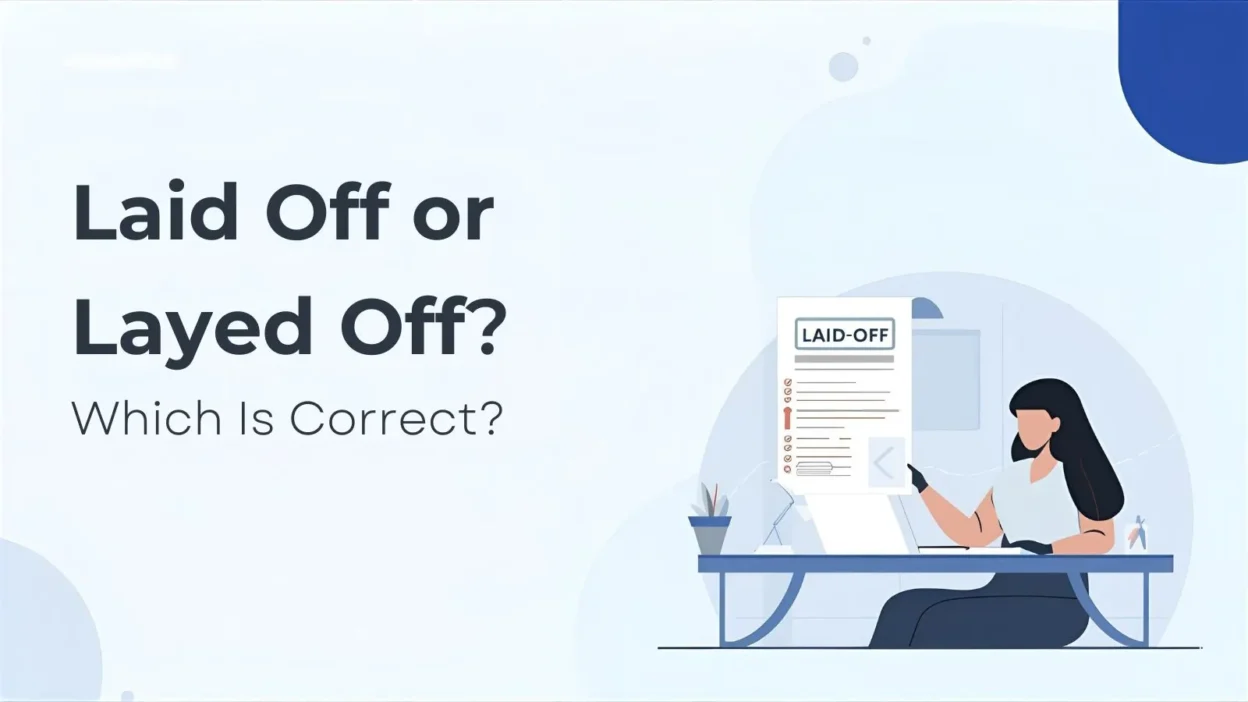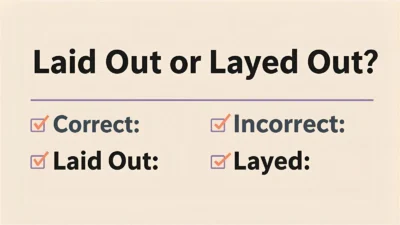I remember the first time I wasn’t sure if it’s laid off or layed off. Both sounded correct, and I kept second-guessing myself.
If you’ve ever faced the same confusion, you’re definitely not alone. This mix-up happens to many people because the words look and sound so similar.
But here’s the good news — only one of them is actually right.
In this short guide, I’ll explain the difference clearly and help you always choose the correct spelling.
Laid Off or Layed Off – Quick Answer
✅ Correct: Laid off
❌ Incorrect: Layed off
Example:
- ✅ She was laid off last month due to budget cuts.
- ❌ She was layed off last month due to budget cuts.
Quick Explanation:
The past tense of lay is laid, not layed. The word layed is not recognized in modern English dictionaries and is considered a spelling error.
The Origin of “Laid Off or Layed Off”
The confusion starts with the verb “lay.”
- Lay means “to put or place something down.”
- Its past tense is laid, not layed.
The phrase “laid off” originally meant to be “temporarily dismissed from work.” It became common in business English during the 1950s and 1960s.
There’s no historical record of layed off being correct — though older texts sometimes show it as a nonstandard spelling.
British English vs American English Spelling
Both British and American English use “laid off.”
There is no regional difference — layed off is wrong everywhere.
However, the usage context may differ:
- 🇺🇸 In the US, “laid off” often refers to job loss due to company downsizing.
- 🇬🇧 In the UK, “made redundant” is more common, but “laid off” is still understood.
Comparison Table
| Context | Correct Term | Common Alternative | Example |
|---|---|---|---|
| US English | Laid off | Fired (informal) | He was laid off after the merger. |
| UK English | Laid off / Made redundant | Sacked (informal) | She was made redundant last year. |
| Incorrect Form | ❌ Layed off | — | She was layed off due to restructuring. |
Which Spelling Should You Use?
Always use “laid off.”
Here’s how to choose based on your audience:
- For US readers: ✅ Use “laid off” (standard business English).
- For UK/Commonwealth readers: ✅ “Laid off” is fine, though “made redundant” is more formal.
- For international content: ✅ Stick with “laid off” — it’s universally correct and recognized globally.
Common Mistakes with “Laid Off or Layed Off”
- ❌ He was layed off from his job. → ✅ He was laid off from his job.
- ❌ They have layed off workers every year. → ✅ They have laid off workers every year.
- ❌ The company layed off too many employees. → ✅ The company laid off too many employees.
Tip: Remember — lay → laid → has laid.
There’s no “layed” form in modern English.
“Laid Off” in Everyday Examples
Here’s how you’ll see “laid off” used across different contexts:
| Context | Example Sentence |
|---|---|
| Email/Work | I was laid off due to restructuring, but I’m open to new opportunities. |
| News | The company laid off 2,000 employees amid the economic slowdown. |
| Social Media | Got laid off today — tough times, but I’m staying positive. |
| Formal Writing | Several staff members were laid off as part of cost-cutting measures. |
These examples show that “laid off” is used in both personal and professional communication.
Laid Off or Layed Off – Google Trends & Usage Data
According to Google Trends, searches for “laid off” dominate globally, while “layed off” appears rarely — mostly from spelling errors.
| Keyword | Global Search Share | Correctness |
|---|---|---|
| Laid off | 98% | ✅ Correct |
| Layed off | 2% | ❌ Incorrect |
Top countries searching “laid off”:
- United States 🇺🇸
- Canada 🇨🇦
- United Kingdom 🇬🇧
- India 🇮🇳
- Australia 🇦🇺
This data clearly shows: “laid off” is the recognized and accepted spelling worldwide.
FAQs:
1. Is “layed off” ever correct?
No. Layed is not a correct word in modern English. Always use laid off.
2. What is the past tense of “lay”?
The past tense of lay is laid.
3. Can I say “I got layed off”?
No. The correct form is I got laid off.
4. Is “laid off” the same as “fired”?
Not exactly. Laid off usually means job loss due to company changes, not personal performance.
5. Is “laid off” formal or informal?
It’s neutral — used in both professional and everyday writing.
6. What’s the UK version of “laid off”?
Often, made redundant is used instead.
7. Can “layed” be used in any context?
Rarely. It’s only seen in very old texts; modern English never uses layed.
Conclusion (150–200 words)
When it comes to “laid off or layed off,” the answer is simple: “laid off” is always correct.
English verbs can be confusing, but remembering the pattern lay → laid → has laid makes it easy.
If you’re writing a resume, professional email, or LinkedIn post, using “laid off” shows correctness and credibility. The form “layed off” may sound right but looks wrong — and readers will notice.
Across American, British, and global English, “laid off” is the accepted spelling. So next time you describe a job loss, remember: it’s “laid off,” never “layed off.”
Keep your English clean, clear, and confident — because the right spelling always makes the right impression.

Hi, I’m Jason Carter, the author behind GrammarNestly.com.
I’m a grammar expert with a passion for helping readers understand the English language in a simple and practical way.
I love breaking down confusing grammar rules and turning them into easy, everyday lessons that anyone can follow.



